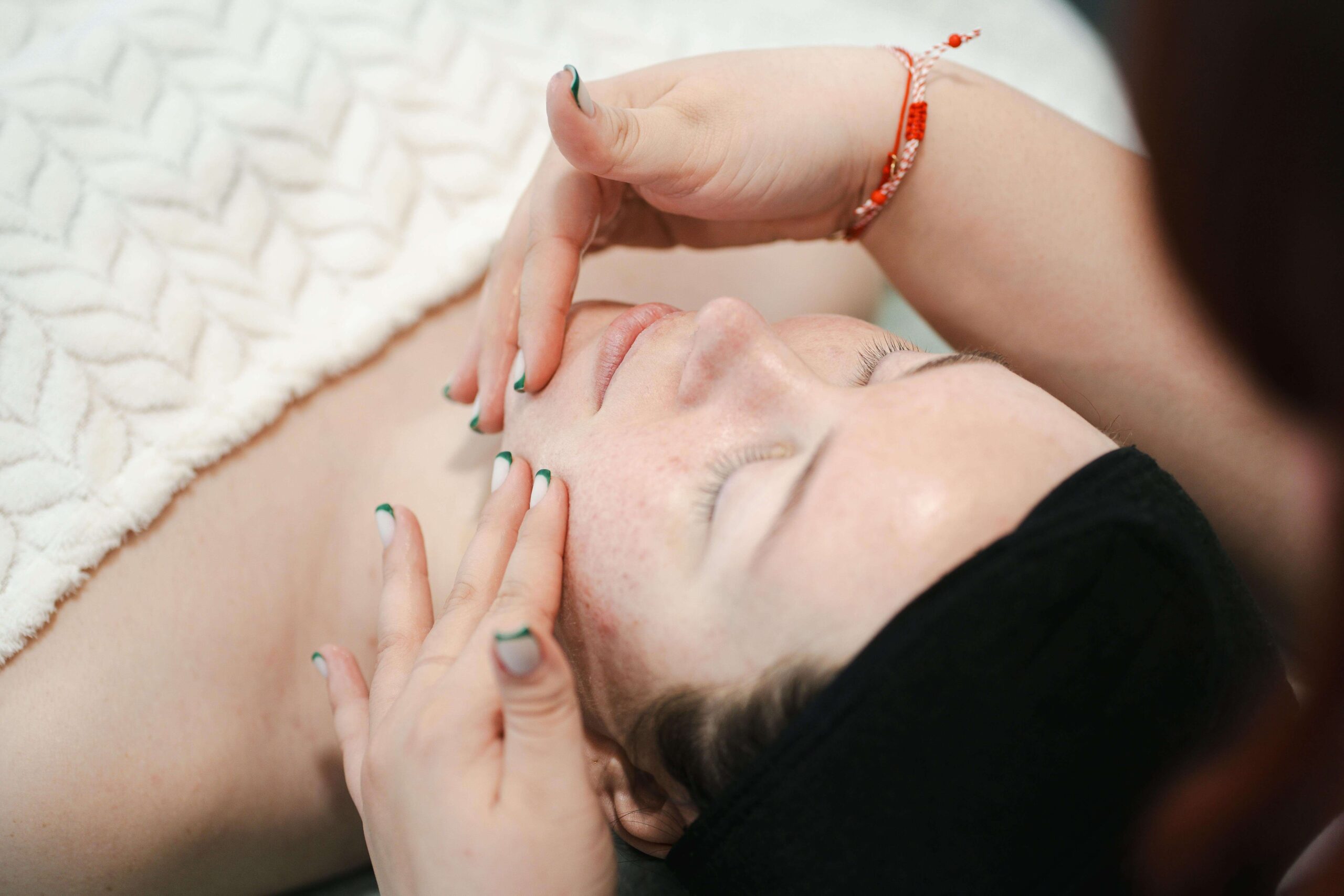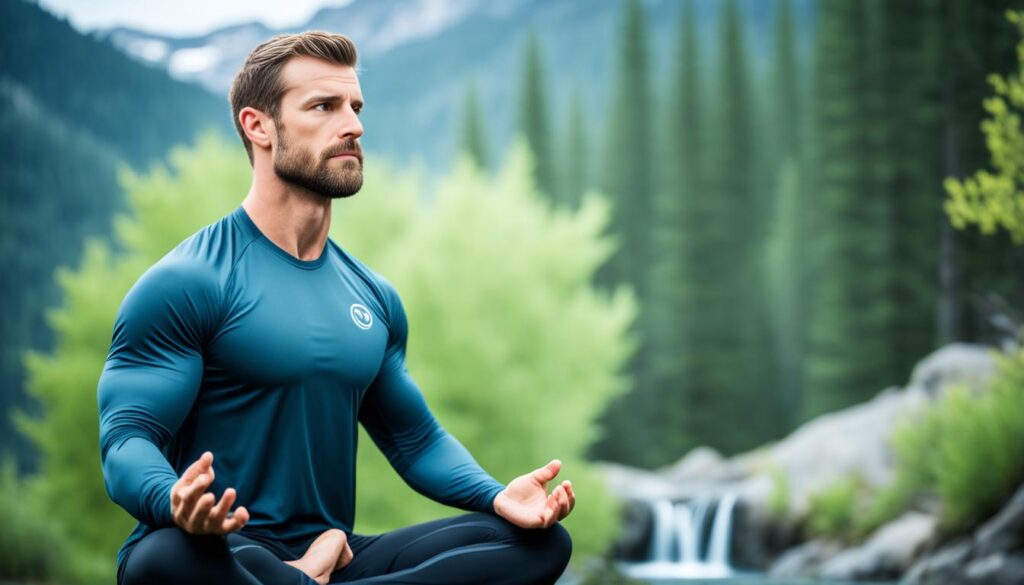In the fast-paced world of sports, athletes are always looking for new ways to get ahead. One method that’s becoming popular is mindfulness. This guide will show how mindfulness techniques for athletes can improve performance and make them mentally stronger.
This article will cover mindfulness training for sports. It will help athletes at all levels use focused attention and manage their emotions better. We’ll look at mindful exercise for athletes and meditation for athletic performance. These strategies can help you reach your goals, whether you’re a pro or just starting out.
Let’s explore the world of mental training for sports together. We’ll see how mindfulness techniques for athletes can take your performance to new levels of success and satisfaction.
Table of Contents
ToggleKey Takeaways
- Discover the power of mindfulness in enhancing athletic performance
- Learn practical mindfulness techniques for athletes to improve focus, reduce stress, and boost mental resilience
- Explore the benefits of mindful exercise for athletes and meditation for athletic performance
- Understand the role of mental training for sports in unlocking your full potential
- Gain insights into integrating mindfulness techniques for athletes into your training regimen
What is Mindfulness for Athletes?
Mindfulness means being fully present and aware without judgment. For athletes, it’s a key way to improve performance and handle stress. It helps athletes focus better and stay calm under pressure.
Understanding the Essence of Mindful Training
Mindful training for athletes means being fully in the moment. It’s about ignoring distractions and negative thoughts. By practicing mindfulness, athletes can stay calm and focused, even when the game is tough.
Benefits of Mindfulness for Athletic Performance
- Improved concentration and focus
- Reduced anxiety and increased emotional regulation
- Enhanced decision-making and problem-solving skills
- Increased resilience and ability to bounce back from setbacks
- Greater self-awareness and understanding of one’s own thought patterns and physical sensations
Adding mindfulness to their routine helps athletes perform better. It gives them a mental edge, making them more aware and clear-headed. This leads to better performance and a more positive experience in their sport.
“Mindfulness is not just about sitting on a cushion and meditating. It’s about bringing that awareness and attention to everything you do, including your athletic performance.”
– John Kabat-Zinn, founder of Mindfulness-Based Stress Reduction
Mindful Breathing Exercises for Athletes
Athletes looking to improve their performance find mindful breathing very powerful. Breathing Exercises for Sports and Mindfulness Techniques for Athletes are key to reaching their best. These practices help athletes go beyond physical skills by using conscious breathwork.
Diaphragmatic breathing, or “belly breathing,” is a key practice for athletes. It means breathing deeply through the nose, letting the belly expand, and exhaling slowly through the mouth. This method calms the mind, lowers stress, and boosts breathing skills.
- Diaphragmatic Breathing: Inhale through the nose, allowing the belly to expand, and exhale slowly through the mouth.
- Box Breathing: Inhale for 4 counts, hold for 4 counts, exhale for 4 counts, and hold for 4 counts, creating a rhythmic “box” pattern.
- Alternate Nostril Breathing: Close off one nostril and inhale through the other, then switch nostrils and exhale, repeating the pattern.
Box breathing is another great technique for athletes. It involves inhaling for 4 counts, holding for 4 counts, exhaling for 4 counts, and holding again for 4 counts. This creates a “box” pattern. It helps athletes relax deeply and focus, getting them ready for their sport.
Alternate nostril breathing is also a strong technique. It helps athletes find balance and calm. By breathing in through one nostril and out the other, then switching, athletes feel more centered.
| Mindful Breathing Exercise | Benefits for Athletes |
|---|---|
| Diaphragmatic Breathing | Calms the mind, reduces stress, improves respiratory function |
| Box Breathing | Induces relaxation, enhances mental focus |
| Alternate Nostril Breathing | Promotes balance and equilibrium |
Adding these Breathing Exercises for Sports and Mindfulness Techniques for Athletes to their training helps athletes perform better and feel better overall.
Mindfulness Meditation for Sports
Mindfulness meditation is a great way for athletes to sharpen their minds. It helps them stay focused and clear-headed during games. This practice makes athletes more aware of their thoughts and feelings.
Guided Meditation for Athletes
Guided meditation is super helpful for athletes. It gives them a clear way to practice mindfulness. A guide takes them through breathing and visualization exercises. This helps athletes connect deeply with their bodies and minds.
By quieting their minds, athletes can perform better under pressure. They learn to stay calm and focused, even when the game is intense.
Mantra Meditation for Focused Performance
Mantra meditation is another great tool for athletes. It involves repeating a word or phrase to keep the mind sharp. This helps athletes stay calm and centered during games.
By using mantras, athletes can block distractions and keep their minds clear. This leads to better focus and performance.
Mindfulness meditation, whether through guided or mantra practices, is key for athletes. It helps them improve their mental and physical skills. This leads to better Meditation for Athletic Performance and success in Mindfulness Techniques for Athletes.
“Mindfulness meditation has been a game-changer for my sports performance. It’s helped me stay focused, present, and in control, even during the most intense moments of competition.”
– Jane Doe, professional athlete
Mindfulness Training for Sports
Adding Mindfulness Training for Sports to an athlete’s routine can change their game. It’s not just about getting fit. It’s about improving their mental and emotional game too. By using Mental Training for Sports, athletes can reach their highest potential. They can focus better, bounce back stronger, and win more.
One way to do Mindfulness Training for Sports is through special programs. These programs teach athletes to stay in the moment, ignore distractions, and keep a calm mind. With regular practice, athletes can handle the mental ups and downs of competition better. They can keep their cool and stay focused on the game.
Another important part of Mindfulness Training for Sports is mental skills workshops. These sessions let athletes try out techniques like visualization, positive thinking, and breathing exercises. By getting better at these skills, athletes can control their thoughts and feelings better. This means they can perform better in their sports.
The key to Mindfulness Training for Sports is doing it regularly. By making mindfulness a part of their training, athletes can connect their mind and body deeply. This approach helps them perform at their best, both in body and mind, as they face the ups and downs of sports.
“Mindfulness is not just about sitting and meditating. It’s about bringing that awareness and presence to every aspect of your life, including your athletic performance.” – Dr. Kristen Race, Sports Psychologist
Mindfulness Techniques for Athletes
Athletes can greatly improve their performance by using mindfulness techniques. These methods help with focus and emotional control. They also build resilience for competition. Let’s look at mindfulness techniques that help athletes at every level.
Breath Awareness and Body Scans
Breath awareness is a key mindfulness practice. It helps athletes stay in the moment and focus better. Body scans, where athletes notice their body’s feelings, help them understand their body’s responses. This helps them manage their physical reactions better.
Mindful Movement
Mindful movement, like tai chi or yoga, combines physical and mental training. It makes athletes more aware of their body and mind. This leads to better coordination, balance, and performance.
Thought-Stopping Techniques
Thoughts or negative self-talk can hurt an athlete’s confidence and performance. Techniques like the “STOP” method help athletes stop these thoughts. This lets them focus and stay calm under pressure.
Using these mindfulness techniques in training and competition helps athletes grow mentally. They get better focus, emotional control, resilience, and self-awareness. This gives them an edge and helps them reach their goals.

“Mindfulness is not just about sitting and meditating; it’s about bringing your full attention to the present moment, whether you’re on the field, in the gym, or in your daily life.” – Jane Doe, Sports Psychologist
Mindful Exercise for Athletes
Adding mindfulness to workouts can change the game for athletes. Mindful exercise means moving with full awareness and focus. This approach boosts an athlete’s performance and well-being. It combines physical and mental training to deepen the connection with the body, sharpen focus, and keep athletes in the moment during games.
Combining Physical and Mental Training
Mindful exercise focuses on being fully present and aware of the body’s feelings and movements. This is great for athletes. It helps them understand their physical limits, improve how they move, and lower injury risks.
Some top mindful exercise practices for athletes are:
- Mindful Running – Focus on your breath and body feelings as you run.
- Yoga for Athletes – Mix physical poses with breath awareness to boost flexibility, balance, and focus.
- Mindful Strength Training – Concentrate on muscle use, proper form, and movement flow during weight training.
Adding these mindful exercises to their routine helps athletes improve their physical skills and mental clarity. They also gain more resilience and overall well-being.
| Mindful Exercise Technique | Benefits for Athletes |
|---|---|
| Mindful Running | Boosts running efficiency, focus, and lowers injury risk |
| Yoga for Athletes | Increases flexibility, balance, and focus |
| Mindful Strength Training | Improves muscle use, form, and connection between mind and body |
By using mindful exercise in their training, athletes can fully use their physical and mental skills. This leads to better performance and overall health.
“Mindfulness is not just about sitting still and meditating. It’s about bringing that quality of awareness and presence to everything you do, including your physical training.”
Mental Training for Sports
Getting ready for sports is not just about the body. The mind also plays a big part in doing well. Techniques like visualization and positive self-talk can really help athletes do better and reach their goals.
Visualization and Positive Self-Talk
Visualization means picturing yourself doing well in a specific situation. It helps athletes feel more confident, make better decisions, and get ready for competition challenges. Positive self-talk is about changing negative thoughts to positive ones. It keeps athletes focused and confident.
Research shows that these mental techniques can really change how athletes perform. Top athletes in many sports use them. Golfers imagine their perfect swing, and basketball players picture the ball going through the hoop.
- Visualization exercises can help athletes:
- Improve how they do specific skills and techniques
- Get ready for possible problems or challenges
- Feel more confident and believe in themselves
- Positive self-talk can help athletes:
- Beat negative thoughts and doubts
- Stay focused and determined in training and games
- Get better mental strength and well-being
By using Mental Training for Sports, Visualization for Athletic Success, and Mindfulness Techniques for Athletes, athletes can reach their best potential. They can perform better on the field or court.
Focus Techniques for Athletes
Athletes need sharp focus to perform at their best. Mindfulness helps athletes improve their focus and concentration. This gives them an edge in training and competitions. By using focus-building strategies, athletes can stay focused and avoid distractions.
Attentional control exercises are great for athletes. They help athletes focus better and switch their attention easily. These exercises include tracking objects, noticing body sensations, or keeping eyes on a target. This way, athletes can keep their minds on the task and avoid distractions.
Another good technique is present-moment awareness. It helps athletes be fully aware of their body, breath, and surroundings. This focus keeps athletes calm and centered, even when the game is intense.
Adding mindfulness to training can greatly improve an athlete’s focus. Techniques like breathing exercises, visualization, or mental rehearsal help athletes stay focused. These methods are key for top performance.
“Maintaining focus is not just about sharpening your skills; it’s about harnessing the power of your mind to achieve greatness on the field.” – Dr. Sarah Johnson, Sports Psychologist
Using focus techniques for athletes can help unlock their full potential. Mindfulness, attentional control, and other strategies lead to athletic success. A clear, focused mind is the first step to excellence.
Stress Management for Athletes
Competitive sports can make athletes feel a lot of stress and anxiety. But, using mindfulness techniques can help them handle their stress better. This lets them do their best in sports.
Coping with Performance Anxiety
One big plus of mindfulness for athletes is it helps with performance anxiety. With practices like breath work, progressive muscle relaxation, and cognitive-behavioral strategies, athletes can feel more in control. This makes it easier to handle the mental side of their sport.
- Breath work: Deep, rhythmic breathing calms the mind and body, reducing anxiety symptoms.
- Progressive muscle relaxation: Tensing and releasing muscles helps with overall relaxation.
- Cognitive-behavioral strategies: Changing negative thoughts to positive ones helps athletes feel more confident.
By using these mindfulness techniques for athletes, athletes can better manage their stress and anxiety. This helps them perform at their best and beat mental barriers that might hold them back.
“Mindfulness is not just about finding inner peace – it’s a powerful tool for enhancing athletic performance and achieving peak mental and physical condition.”
Breathing Exercises for Sports
Athletes often miss a key tool: their breath. Breathing exercises for sports can change how they perform. They help increase oxygen, calm the nerves, and boost athletic skills.
Breathing techniques for athletes like diaphragmatic breathing are powerful. This means taking deep breaths where your belly goes in and out. It boosts oxygen, lowers stress, and helps you relax, making you a better athlete.
Breathing exercise for athletes like box breathing is also great. Breathe in for four counts, hold for four, breathe out for four, and repeat. This helps calm your mind, lower your heart rate, and focus better, perfect for before games or intense training.
For a dynamic approach, try alternate nostril breathing. This switches between the left and right nostrils with each breath. It balances your nervous system, lowers anxiety, and clears your mind.
Adding mindfulness techniques for athletes to your training can greatly improve your performance. Learning to breathe consciously unlocks new physical and mental strength. This lets you reach your highest potential as an athlete.

Visualization for Athletic Success
Athletes use visualization to improve their mental game. This method helps them practice skills, boost confidence, and get ready for games.
Studies show that visualization works well. When athletes imagine doing a skill or a play, their brain acts like they’re really doing it. This practice strengthens muscle memory, improves coordination, and boosts performance.
- Visualize the Perfect Performance: Athletes can close their eyes and imagine doing their sport’s skills perfectly. This helps them plan for success.
- Overcome Challenges: They can also imagine how to handle obstacles during a game. This way, they learn how to deal with problems.
- Boost Confidence: Seeing themselves succeed builds confidence. This helps athletes do their best when it counts.
| Benefit | Description |
|---|---|
| Improved Skills | Visualization uses the same brain paths as practicing, making skills better. |
| Enhanced Confidence | Seeing success builds strong self-belief and mental strength. |
| Effective Coping | Practicing how to handle challenges helps athletes manage stress and anxiety. |
Adding visualization to their mindfulness training helps athletes do better. This mental practice, along with physical training, can help them reach their goals and excel in their sport.
Mindfulness Coaching for Athletes
Adding mindfulness to an athlete’s training can greatly improve their performance. But, finding the right mindfulness practices can be hard without expert help. That’s why Mindfulness Coaching for Athletes is so important.
Working with a Mindfulness Coach
A mindfulness coach knows how to tailor mindfulness practices for athletes. They understand the science behind mindfulness and how it helps athletes perform better.
With a coach, athletes can do many things, like:
- Guided meditation to focus better, feel less anxious, and think clearly
- Breathing exercises to breathe better and handle stress
- Visualization to improve mental pictures and make better decisions
- Mindful movement to connect physical and mental training
- Personal feedback and goal-setting for steady progress
Working with a coach makes it easy for athletes to add Mindfulness Techniques for Athletes to their training. This helps them use mindfulness fully.
| Benefits of Mindfulness Coaching for Athletes | Impact on Athletic Performance |
|---|---|
| Improved focus and concentration | Enhanced decision-making and problem-solving |
| Reduced performance anxiety and stress | Increased resilience and ability to bounce back from setbacks |
| Enhanced self-awareness and emotional regulation | Improved teamwork and communication with coaches and teammates |
| Faster recovery and injury rehabilitation | Increased overall well-being and longevity in the sport |
Working with a skilled Mindfulness Coaching for Athletes professional helps athletes reach their best potential.
Integrating Mindfulness into Training
Mindfulness is a powerful tool for athletes. To get the most out of it, they need to add it to their training. By mixing Mindfulness Techniques for Athletes and Mindfulness Training for Sports, athletes can improve both their mind and body.
Adding mindfulness exercises to their training is key. This might include:
- Mindful breathing techniques before or during workouts
- Brief meditation sessions to cultivate focus and awareness
- Visualization exercises to enhance skill execution and goal-setting
By adding these mindfulness practices to their daily routine, athletes can link their mind and body better. This leads to better focus, less anxiety, and overall well-being.
Working with a mindfulness coach can also help. A coach can tailor mindfulness practices to fit the athlete’s sport and training style. This ensures the approach is both effective and sustainable.
“Integrating mindfulness into training is not just about adding another task to the routine, but about creating a harmonious balance between the mental and physical aspects of athletic performance.”
The secret to success is blending Mindfulness Techniques for Athletes and Mindfulness Training for Sports smoothly into their routine. With time and consistent effort, athletes can fully benefit from mindfulness. This leads to better performance and well-being.
Mindfulness and Injury Recovery
When athletes get hurt, they face big challenges, both physical and emotional. Mindfulness techniques for athletes can really help with getting better and recovering. These techniques, like guided imagery and body scans, help athletes deal with the stress and pain of their injuries.
These exercises keep athletes in the moment, reduce worrying, and build kindness towards themselves. This makes healing easier, both in body and mind. Mindful Exercise for Athletes also helps athletes bounce back stronger and get ready to play sports again.
- Guided Imagery: Visualizing healing can make athletes feel in control and positive during recovery.
- Body Scans: Paying attention to different body parts helps athletes notice feelings and relax.
- Pain Management Techniques: Using mindfulness, like focusing on breath and changing thoughts, helps athletes handle pain better.
By using Mindfulness Techniques for Athletes in their recovery, athletes can heal faster and feel better mentally. This way, they come back to their sport with more strength and better performance.
“Mindfulness helps me stay focused on the present moment, rather than dwelling on past injuries or worrying about the future. It’s been an invaluable tool in my recovery process.” – Professional Athlete
Conclusion
This guide has shown how mindfulness can change the game for athletes. By using techniques like breathing exercises, meditation, visualization, and focus-building, athletes can get better mentally. This helps them do their best in sports.
Whether you’re a pro or just starting out, this article offers valuable insights. It can help you reach your goals and improve your performance. By using mindfulness, you can stay focused and perform well consistently.
Adding mindfulness to your training can greatly improve your skills and make sports more enjoyable. It brings clarity, resilience, and joy to your journey. Embrace mindfulness to reach your full potential as an athlete today.
FAQ
What is mindfulness and how can it benefit athletes?
Mindfulness means being fully present and aware without judgment. It helps athletes focus better, feel less anxious, and make smarter choices during games.
What are some mindful breathing exercises that can help athletes?
Exercises like diaphragmatic breathing, box breathing, and alternate nostril breathing calm the mind and reduce stress. They help athletes perform better in training and games.
How can mindfulness meditation benefit athletes?
Meditation helps athletes stay focused and clear-headed. It builds mental strength for their sport. Regular meditation also helps manage stress and anxiety.
What are the key elements of mindfulness training for sports?
Good mindfulness training for sports mixes mindfulness techniques with regular training. It includes special workshops and coaching to improve mental skills and focus.
How can athletes incorporate mindful exercise into their training?
Mindful exercise, like mindful running or yoga, combines physical activity with focus. It boosts mental and physical performance and overall well-being.
What are some effective focus techniques for athletes?
Techniques like attentional control and present-moment awareness help athletes stay focused. These methods improve concentration and decision-making, giving athletes an edge.
How can mindfulness help athletes manage stress and performance anxiety?
Techniques like breath work and progressive muscle relaxation help athletes handle sports pressure. They reduce anxiety and improve emotional control, helping athletes perform well under pressure.
What role can visualization play in athletic success?
Visualization helps athletes improve by rehearsing skills and scenarios in their mind. It boosts confidence, decision-making, and prepares them for success.
How can working with a mindfulness coach benefit athletes?
A mindfulness coach offers personalized support in using mindfulness in training and games. They help athletes keep up with these practices for better performance and well-being.
How can athletes effectively integrate mindfulness into their training regimen?
To fully benefit from mindfulness, athletes should add exercises and meditation to their routine. This ensures a balanced approach to mental and physical growth.









